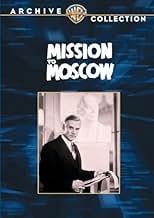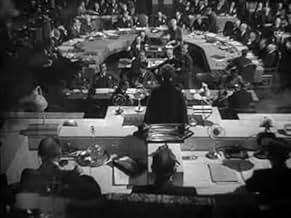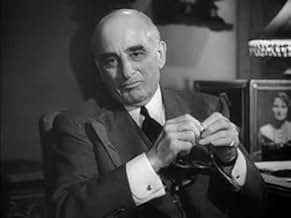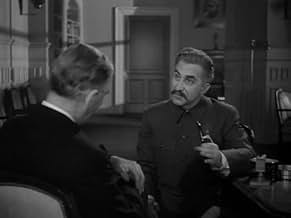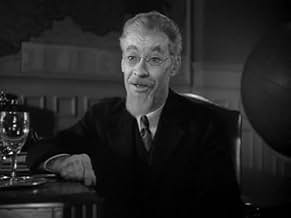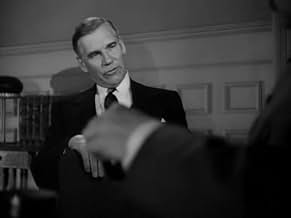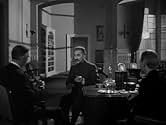IMDb RATING
5.4/10
1.1K
YOUR RATING
Ambassador Joseph Davies is sent by FDR to Russia to learn about the Soviet system and returns to America as an advocate of Stalinism.Ambassador Joseph Davies is sent by FDR to Russia to learn about the Soviet system and returns to America as an advocate of Stalinism.Ambassador Joseph Davies is sent by FDR to Russia to learn about the Soviet system and returns to America as an advocate of Stalinism.
- Nominated for 1 Oscar
- 2 wins & 1 nomination total
- Director
- Writers
- All cast & crew
- Production, box office & more at IMDbPro
Featured reviews
It's 1943, and Hollywood decides that a good 'educational' drama is needed to reassure an American public that is somewhat conflicted on being allied with Soviet Russia for the Second World War. Thus we are treated to this picture, one of the most scurrilously evil films that has ever had wide release. Yes, I said evil. No, there's no gratuitous sex or violence or bad language in the film. Just a wholesale haigiography of history's most prolific mass murderer, and the mendacious celebration of a regime whose primary accomplishment was to torture and/or murder tens of millions of people. Other reviewers have compared it as a propaganda piece akin to "Triumph of the Will" or "Battleship Potemkin", but this shameful film has none of Riefenstahl's artistic direction or Eisenstein's imagery. Just one monstrous lie after another served up to justify aggression, war-mongering, totalitarianism, secret police tactics, repression and every other evil of the 20th century. In a just world the makers of this film, if they were not duped into believing it themselves, should have been consigned to the Gulag that they glorified with this hateful piece.
Among the comments here I don't see much recognition of the fact that this propaganda film was released at the height of World War II, when the battle against Nazis was focused on Stalingrad, which arguably was the crucial battle of the war in Europe.
The context of this film cannot be ignored or minimized. Propaganda films are morale films, and the omissions and distortions which have been cited in Mission to Moscow are beside the point. Of course Stalin was a monster before, during and after World War II. Of course Joseph E. Davies was a naif, and a pompous one at that. Perhaps that's why he only lasted a year as ambassador.
On one hand, there is an absolutely ludicrous review here, praising Mission to Moscow as dispelling the terrible calumnies against the great Soviet achievements. On the other hand, there are those on the opposite side who, though far more accurate about Stalin and about how this film whitewashes his atrocities, seem so rabid in their responses, they fail to understand, or conveniently ignore, that propaganda films as documentaries are more or less bull, and that it's stupid to criticize a propaganda film because it's a propaganda film.
What is interesting about Mission to Moscow is not what it is trying to say or do, which requires little insight to divine, but how well it does it. This is a Hollywood "A" film enlisted in the service of propaganda. Top cast, direction and production values should have made for a very strong message to 1943 American audiences, whom the government wanted to think of the war against Germany as "We're all in this together."
As to the outrage of Stalin's show trials, I think that the sinister, menacing demeanor of one of the great Hollywood heavies Victor Francen as prosecutor Vyshinsky, versus the rather meek, contemplative demeanor of the defendants, suggests that the film knows what's going on, even if Davies doesn't.
Yes, the relentless pro-Soviet propaganda is a bit hard to take for those who sit smugly in the light of hindsight. But if you look at Mission to Moscow as document rather than documentary, you will gain an insight into the kind of public mindset called for by our government at a crucial moment in our history.
The context of this film cannot be ignored or minimized. Propaganda films are morale films, and the omissions and distortions which have been cited in Mission to Moscow are beside the point. Of course Stalin was a monster before, during and after World War II. Of course Joseph E. Davies was a naif, and a pompous one at that. Perhaps that's why he only lasted a year as ambassador.
On one hand, there is an absolutely ludicrous review here, praising Mission to Moscow as dispelling the terrible calumnies against the great Soviet achievements. On the other hand, there are those on the opposite side who, though far more accurate about Stalin and about how this film whitewashes his atrocities, seem so rabid in their responses, they fail to understand, or conveniently ignore, that propaganda films as documentaries are more or less bull, and that it's stupid to criticize a propaganda film because it's a propaganda film.
What is interesting about Mission to Moscow is not what it is trying to say or do, which requires little insight to divine, but how well it does it. This is a Hollywood "A" film enlisted in the service of propaganda. Top cast, direction and production values should have made for a very strong message to 1943 American audiences, whom the government wanted to think of the war against Germany as "We're all in this together."
As to the outrage of Stalin's show trials, I think that the sinister, menacing demeanor of one of the great Hollywood heavies Victor Francen as prosecutor Vyshinsky, versus the rather meek, contemplative demeanor of the defendants, suggests that the film knows what's going on, even if Davies doesn't.
Yes, the relentless pro-Soviet propaganda is a bit hard to take for those who sit smugly in the light of hindsight. But if you look at Mission to Moscow as document rather than documentary, you will gain an insight into the kind of public mindset called for by our government at a crucial moment in our history.
Businessman Joseph Davies is sent to Stalin's Russia by FDR shortly before war breaks out. His assignment: assess the Soviet's war-making capabilities, the extent of their war-readiness and Stalin's reliability as a potential ally against Hitler. What he sees contradicts a good deal of the anti-Soviet reporting in the (Henry Luce) national press and elsewhere. The Soviets have organized a society of largely peasants and serfs into a first-class industrial power. The Stalin regime enjoys widespread popular support, and the Kremlin seems to be preparing for war with the Nazis. On the other hand, as Stalin warns half-way through the film, anti-Soviet feeling in the British and French governments may necessitate a temporary Soviet "truce" with Hitler to gain more time to prepare for war.
The film (by the director of "Casablanca" is frequently plodding and arcane. However, for war-time audiences, it offered an sure-footed defense of the Russian war effort at a time when the full capabilities of the Soviet Red Army were being dramatically made known (the film was released shortly after the seminal German surrender at Stalingrad, the most frightful battle of modern warfare). Too, much of the film suggests what recent historians have confirmed; Stalin's regime, while widely loathed in the West, precipitated an astonishing degree of devotion and loyalty at home, a point driven home by the outcome of a thousand battles from the Volga to Berlin.
It seems that just about every bit player in Hollywood appeared at least once in this movie. Watch especially for Glenn Strange in a three second appearance as a southern newspaper reporter. The fillm was a major part of the war effort half-way through that conflict, and appears to have succeeded admirably in its original purpose. Walter Huston, as Davies, is absolutely first rate as the droll, understated American capitalist who nevertheless comes to appreciate the war effort of a much maligned people and social system.
The film (by the director of "Casablanca" is frequently plodding and arcane. However, for war-time audiences, it offered an sure-footed defense of the Russian war effort at a time when the full capabilities of the Soviet Red Army were being dramatically made known (the film was released shortly after the seminal German surrender at Stalingrad, the most frightful battle of modern warfare). Too, much of the film suggests what recent historians have confirmed; Stalin's regime, while widely loathed in the West, precipitated an astonishing degree of devotion and loyalty at home, a point driven home by the outcome of a thousand battles from the Volga to Berlin.
It seems that just about every bit player in Hollywood appeared at least once in this movie. Watch especially for Glenn Strange in a three second appearance as a southern newspaper reporter. The fillm was a major part of the war effort half-way through that conflict, and appears to have succeeded admirably in its original purpose. Walter Huston, as Davies, is absolutely first rate as the droll, understated American capitalist who nevertheless comes to appreciate the war effort of a much maligned people and social system.
Self-professed "capitalist" and businessman Joseph Davies is sent to Moscow by President FDR just prior to the outbreak of hostilities in Europe in 1939. His mission; assess the war-readiness of the Soviet people and the reliability of the Stalin regime as a potential ally.
What follows could be described as a "guided tour" of Soviet Russia, courtesy of the Kremlin. Davies embarks on a whirlwind inspection of Soviet farms, factories, schools and cities, all abuzz with the task of transforming a semi-feudal nation of serfs and peasants into a mighty world power. It is - as its critics claim - a heavy-handed glorification of the Soviet "workers" state under Stalin. At the same time, it is an early confirmation of what most recent historians have acknowledged; the Stalin regime, for all its flaws, was a popular regime with the Russian people with astounding achievements to its credit. Viewers, at any rate, can make up their own minds (a useful recent survey is *Stalinism as a Way of Life* - Yale U Press, 2000).
Walter Huston is effective as the droll, efficient Davies. Watch, too, for a plethora of uncredited "B" actors on screen for just a few seconds. Glenn Strange, Tom Tully and Kathleen Lockhart are familiar faces to fans of the thirties and forties and serve to jar us back to reality at critical points. The film is a useful antidote to the overwhelming and omnipotent anti-Sovietism of the Cold War, and should be taken as such.
What follows could be described as a "guided tour" of Soviet Russia, courtesy of the Kremlin. Davies embarks on a whirlwind inspection of Soviet farms, factories, schools and cities, all abuzz with the task of transforming a semi-feudal nation of serfs and peasants into a mighty world power. It is - as its critics claim - a heavy-handed glorification of the Soviet "workers" state under Stalin. At the same time, it is an early confirmation of what most recent historians have acknowledged; the Stalin regime, for all its flaws, was a popular regime with the Russian people with astounding achievements to its credit. Viewers, at any rate, can make up their own minds (a useful recent survey is *Stalinism as a Way of Life* - Yale U Press, 2000).
Walter Huston is effective as the droll, efficient Davies. Watch, too, for a plethora of uncredited "B" actors on screen for just a few seconds. Glenn Strange, Tom Tully and Kathleen Lockhart are familiar faces to fans of the thirties and forties and serve to jar us back to reality at critical points. The film is a useful antidote to the overwhelming and omnipotent anti-Sovietism of the Cold War, and should be taken as such.
I can understand the need for pro-allied propaganda when the outcome of the war was still uncertain, but this was pathetic. It's no surprise that Howard Koch was the screenwriter for this rather sorry effort to promote Soviet propaganda, or that he was later cited by the HUAC. Propaganda can be fun - try North Star or Days of Glory. This movie is not an effort to raise morale or promote a cohesive war effort. It's purpose appears to try to justify any and all the barbaric atrocities committed during the Stalin regime. Example: The show trials were interspersed with remarks by allied journalists approving of the same judicial perversion for which we condemned Germany at Nueremburg. We agreed with the Soviet position that Trotsky was responsible for undermining the good works of the Soviet. We blame ourselves for the Russo-German alliance. The fact that Russia absorbed half of Poland in payment isn't discussed. This movie actually claims it was strategic move to buy time. Davies (Walter Huston) spends the entire movie trying to convince us that the Soviet Union performed a miracle, 5 yrs at a time. Big business is portrayed as greedy capitalists anxious to do business with Germany and Japan in pursuit of the Almighty buck. Russia invaded Finland as an act of self defense etc, etc. The examples are too numerous to mention.
Michael Curtiz' direction, as usual, is exciting and flawless. It is this movies' only saving grace. The early scene when Davies arrives at the Hamburg train station was precious. There are Swastikas everywhere. In typical Curtiz style, shadow troops marched passed the camera. Mein Kampf was for sale everywhere. Pathetic deportees are on the platform - number tags on their chest - waiting for transport to the camps. Hitler Youth marching like toy soldiers. If you can put the politics aside (I couldn't) you can really enjoy the visuals.
But beware, there was a message to this madness.
Michael Curtiz' direction, as usual, is exciting and flawless. It is this movies' only saving grace. The early scene when Davies arrives at the Hamburg train station was precious. There are Swastikas everywhere. In typical Curtiz style, shadow troops marched passed the camera. Mein Kampf was for sale everywhere. Pathetic deportees are on the platform - number tags on their chest - waiting for transport to the camps. Hitler Youth marching like toy soldiers. If you can put the politics aside (I couldn't) you can really enjoy the visuals.
But beware, there was a message to this madness.
Did you know
- TriviaThis film was often mentioned during the 1947 House Un-American Activities Committee (HUAC) in its investigation of alleged Communist infiltration of the motion picture industry and was chiefly responsible for the blacklisting of screenwriter Howard Koch. Warner Bros. studio head Jack L. Warner defended the picture as being "made when our country was fighting for its existence, with Russia as one of our allies . . . The picture was made only to help a desperate war effort and not for posterity."
- GoofsAside from the issue of the fairness of the Moscow purge trials, or the truthfulness of the alleged confessions of the accused, the people shown standing trial together in the film in fact did not all stand trial at the same time. There were two such major show trials, one in 1937, the second in 1938, and the real life characters depicted in the film as being tried simultaneously were actually tried in separate groups at one of the two trials.
- Quotes
Ambassador Joseph E. Davies: Mr. Stalin, I believe history will record you as a great builder for the benefit of mankind.
- Crazy creditsOpens with a card reading: We have the honor to present the former Ambassador from the United States to the Soviet Union, the Honorable Joseph E. Davies, who will address you prior to the showing of the film made from his important book, "Mission to Moscow". In the picture itself, Mr. Walter Huston portrays Mr. Davies during those vital years encompassed in his now significant report to this nation. And now, Mr. Davies: [Mr. Davies gives a presentation on the actual events leading up to these events, and to this film.]
- ConnectionsFeatured in Hollywood on Trial (1976)
- SoundtracksAmerica
(uncredited)
aka "My Country 'tis of Thee"
Music from "God Save the King"
Traditional
[In the score when Woodrow Wilson's bust is shown]
- How long is Mission to Moscow?Powered by Alexa
Details
- Release date
- Country of origin
- Languages
- Also known as
- På uppdrag i Moskva
- Filming locations
- Lake Arrowhead, San Bernardino National Forest, California, USA(Lake that Joe and family set off in a dingy named after his wife Marjorie)
- Production company
- See more company credits at IMDbPro
Box office
- Budget
- $1,516,000 (estimated)
- Runtime
- 2h 4m(124 min)
- Color
- Aspect ratio
- 1.37 : 1
Contribute to this page
Suggest an edit or add missing content

